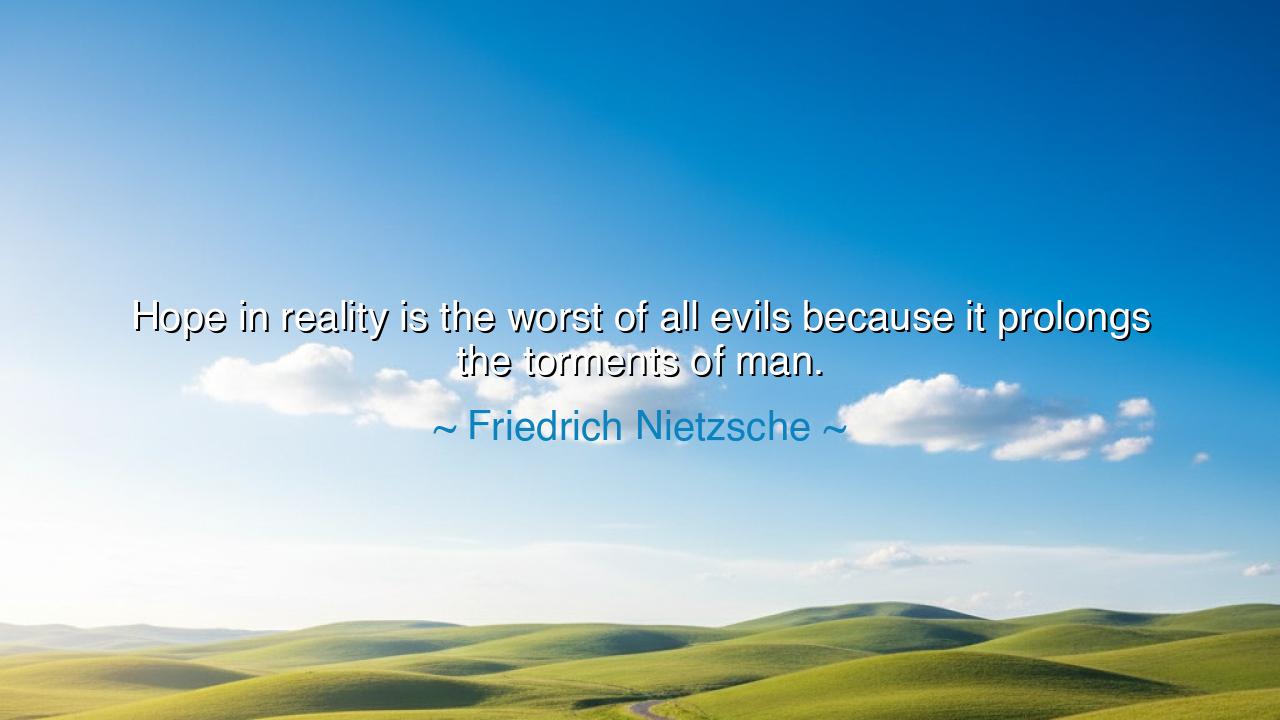
Hope in reality is the worst of all evils because it prolongs the






The words of Friedrich Nietzsche—“Hope in reality is the worst of all evils because it prolongs the torments of man”—are like fire drawn from the depths of human struggle. They shock, they provoke, and they pierce the heart of complacency. Yet, as with all of Nietzsche’s teachings, they are not meant to destroy, but to awaken. In this single line, he overturns the gentle illusion of hope that mankind so often clings to and forces us to confront the darker truth—that sometimes, the very thing we believe sustains us is what keeps us chained to suffering. For Nietzsche, hope is not the tender comfort of the weak, but the cunning instrument of endurance that binds man to the wheel of endless expectation.
To grasp the meaning of these words, we must journey back to their ancient origin. Nietzsche drew this thought from the myth of Pandora’s box, told by the Greeks. When Pandora, the first woman, opened the forbidden jar, she unleashed upon the world all the miseries—disease, sorrow, toil, and despair—that afflict humankind. Only one thing remained inside when she closed it: hope. The poets of old argued that hope was mercy, the last light left to guide mankind through darkness. But Nietzsche, ever the challenger of comfort, saw in that myth a darker irony. Hope, he said, was the most insidious of the evils, for it keeps man waiting, endlessly enduring his suffering instead of ending it. It is the trick of life that makes us bear the unbearable—a sweet poison that prolongs pain.
Yet Nietzsche’s words are not a call to despair; they are a call to courageous truth. He speaks to those who spend their lives waiting for salvation, for fortune, for meaning to descend from above. He warns that hope, when it becomes passive, turns men into prisoners of “someday.” It lulls them into endurance without purpose. To live forever in the promise of tomorrow is to die a little each day in the emptiness of today. Nietzsche demands that we face life without illusion, to look upon suffering not as a punishment to be waited out, but as a test to be overcome through strength, action, and will.
Consider the story of the Russian serfs before their emancipation in 1861. For generations, they lived in poverty, bound to the land, comforted only by the belief that freedom would one day come—that if they endured their misery with patience, the world would right itself. Their hope was not rebellion; it was submission. Decade after decade, that hope kept them quiet while the chains of injustice grew thicker. Only when that hope burned away and was replaced by fury and will did revolution become possible. In this, we see Nietzsche’s meaning: that false hope can be the greatest obstacle to true freedom.
The philosopher did not wish to strip mankind of all light—only of the illusion of light that blinds us to our own power. He knew that suffering is woven into the fabric of existence, and to live honestly, one must not hope for its absence, but learn to bear it with nobility. In Nietzsche’s world, the highest virtue is not to hope, but to create meaning through strength, to forge value where none is given. “Man,” he wrote elsewhere, “is a rope stretched between beast and overman.” The one who abandons false hope and embraces the tragic truth of existence crosses that rope and becomes something greater—a being who no longer endures life, but commands it.
Even in our own time, we can see the wisdom in his warning. How many souls wait endlessly for a dream that never arrives? How many remain in broken relationships, failed ambitions, or stagnant lives because hope whispers, “One day it will change”? Hope, in this form, becomes the jailer of the human spirit. It keeps us clinging to what should be let go, enduring what should be transformed. Nietzsche’s voice, fierce and unyielding, urges us instead to act, to tear down illusions, and to confront the truth—even when it wounds. For only through truth does one find real liberation.
Let this, then, be the teaching: do not mistake hope for strength. Hope that paralyzes is no virtue; it is the velvet chain that binds the will. Instead, cultivate resolve—the power to shape reality rather than wait for it to change. If tomorrow must be better, let it be made so by your hands, not by your wishing. If hardship is your lot, bear it without deceit, and find within it the forge of your greatness. The ancients taught that the hero is not the one who avoids suffering, but the one who looks upon it and says, “I will endure—and I will make meaning from this.”
For in the end, Nietzsche’s challenge is not a hymn to despair, but to awakening. He bids us rise beyond the comfort of false hope and walk in the clarity of truth. To live without illusion is to live as the ancients did—eyes open to the cruelty and beauty of the world, hearts aflame with will. Then, and only then, can we say that we are truly alive—not waiting for life to bless us, but creating the blessing ourselves.






AAdministratorAdministrator
Welcome, honored guests. Please leave a comment, we will respond soon